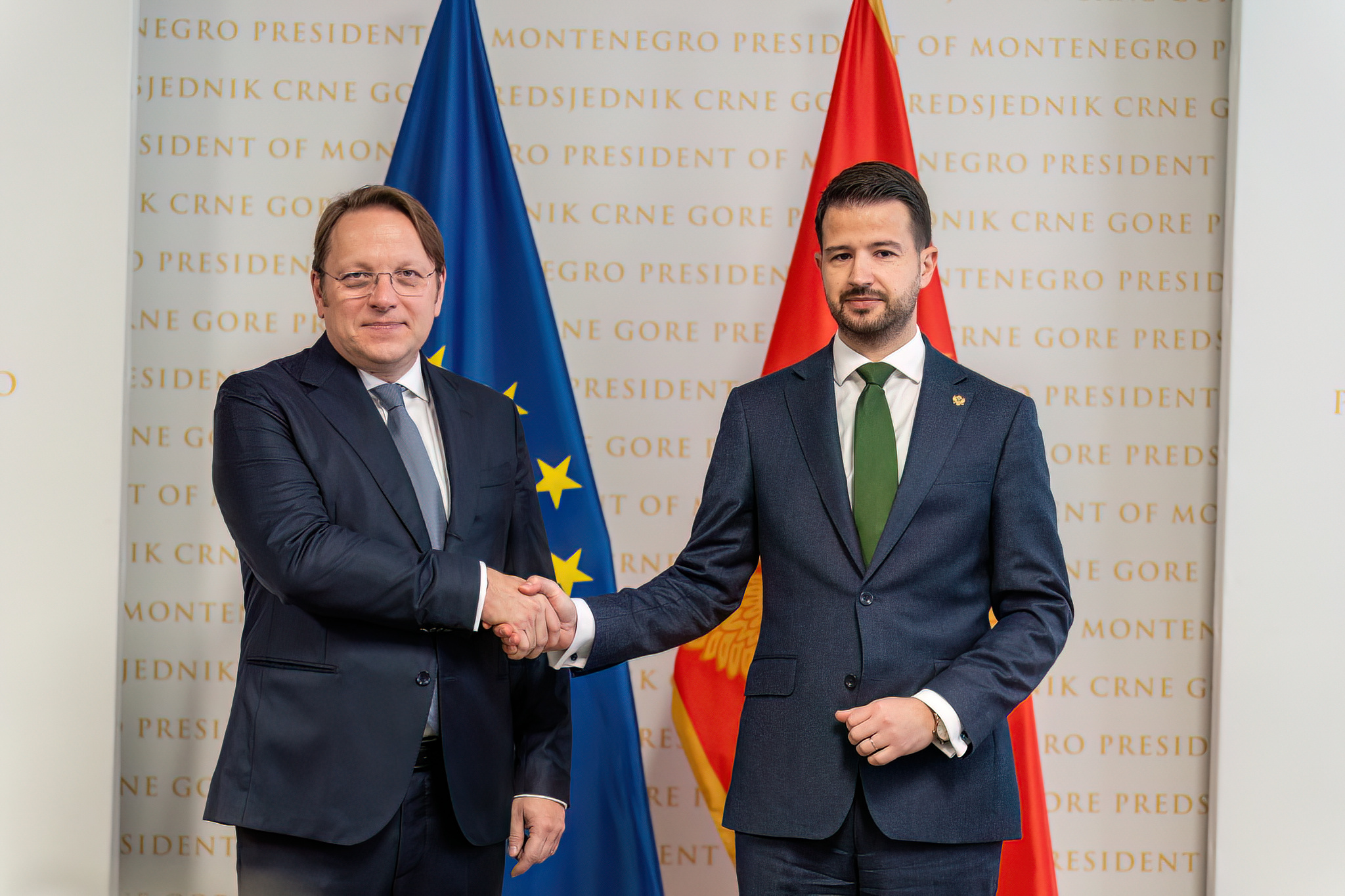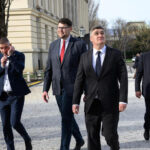There are three pictures that show the real state of affairs when it comes to the credibility of the European policy of the ruling coalition in the Montenegrin Parliament and in the Government of Milojko Spajić.
The first one refers to the recent vote in POSP, in Strasbourg.
The Montenegrin parliamentary delegation at the XXI meeting of the Parliamentary Committee of the European Union and Montenegro for Stabilization and Association (POSP), which was held a few days ago, was mostly in unison when it came to emphasizing the “firm determination” for membership in the European Union.
The members of the European Parliament also reiterated their commitment to help Montenegro become the first member of the EU. That “promise” has suddenly become a “commonplace” of Brussels’ policy towards Montenegro. And that is good.
Everything would have gone as usual – if we treat the new European enthusiasm regarding Montenegro’s membership as usual for the moment – if, at the end, during the adoption of the final document – conclusions and recommendations – the representatives of the coalition “For the Future of Montenegro” (ZBCG) did not request the support for the policy of sanctions against Russia to be removed from the draft.
Nothing new, nor unusual, when it comes to that group. What is worrying – and which clearly indicates the true state of affairs when it comes to the seriousness and foundation of the pro-European conviction of the holders of the parliamebtary and executive power in Montenegro – is that the parliamentarians from the ranks of the “Europe Now” Movement (PES) and the Democrats on this occasion were withheld.
Demonstrating such “restraint” on the occasion of Russia’s criminal aggression against Ukraine is also not accidental. The Montenegrin European agenda is strongly promoted by the Hungarian Oliver Varhelji, European Commissioner for Good Neighborly Relations and Enlargement, but even more so by the Hungarian Minister of Foreign Affairs, Peter Sijarto, who repeated that two or three days ago in Podgorica.
It did not help the members of the Montenegrin opposition in POSP that they also showed the willingness to support the sanctions policy and to confirm in action their commitment to the full compliance of the Montenegrin foreign and defense policy with the EU’s foreign and defense policy.
They are still expected to be a “constructive” opposition, as they were told at the last meeting with the ambassadors of the QUINT countries in Podgorica. That means they should be silent and (continue to) suffer – because the image of so-called Montenegro’s successes on the European road should not be blurred.
The second picture is even more brutal in its nakedness: the latest public opinion survey conducted by NATO shows a dramatic drop in support for Montenegrin membership in the Alliance. Political and all other social trends in the last year have meant that there are even 12% more citizens who are against membership – so now, taking into account a percentage or two as the inevitable margin of error in such polls, the positions “for” and “against” are almost equal: 44% of Montenegrin citizens would vote for Montenegro to leave NATO, while 46% would vote for the country to remain in the Alliance.
That does not excite the Minister of Defense, Mr. Krapović, too much, nor his colleague from the Ministry of Foreign Affairs, Mr. Ivanovic. The first has questioned that public poll, with a few appropriate phrases, and the second has not even mentioned that problem.
Montenegro officially records a huge 80% of citizens’ support for EU membership – which is the leitmotif of the statements of the aforementioned and other Montenegrin officials – who themselves changed their official position on NATO when they entered the government, while the narrative about the EU, as alliance which, in their view, predominantly means economic benefits, was part of their parties’ ideologies even before August 2020.
Such a drastic discrepancy in support for NATO (including support for Ukraine in defense against the Russian aggression) in relation to the commitment to EU membership actually hides the truth about the sincere position and real support for Western values in Montenegro.
Trends in Montenegrin society – both political and cultural, as well as those concerning education, the media and the overall social atmosphere – as well as the behavior of the ruling political groups, show deep disagreement and denial of the postulates of liberal democracy and the values of civil society. That is why the official percentage of support for EU membership is a kind of pleasant self-delusion – which, regardless of everything, should be kept alive, if it can help the Montenegrin European agenda.
The third picture/situation is symbolic in its meaning, considering the actors mentioned there, but it is certainly more serious than it appears at first glance. Namely, the presidential “elections” in Russia, for which they already report that Putin won with (for such regimes and situations) a modest 87% – had “observers” from Montenegro as well.
Mentioning the names of these political marginals would only mean their promotion, so here we will briefly analyze what they actually represent on the Montenegrin political scene, who they represent and what their propaganda messages from Moscow mean.
These are marginal parties, far below the census, and the same marginal “leaders”. They are given great attention and publicity by the Serbian and Russian media both in Serbia and in Montenegro. They are frequent guests of obscure – but highly watched TV channels in Serbia, while their presence in the public in Montenegro is mainly achieved through Serbian national-chauvinist and pro-Russian media outlets and internet portals.
Their actual role and reach are, however, more dangerous than they make out. On the one hand, they are in the ruling coalition (in the capital Podgorica). Neither Spajic’s PES nor Becic’s Democrats see any problem in this, and they express their full tolerance. On the other side is President Milatović, whose chief advisor is Mr. Vukšić, former director of the National Security Agency (ANB), whose (alleged) connections with addresses in Belgrade and Moscow have long been the subject of attention by Western allies.
That Milatović’s key adviser was in a pre-election coalition with “observers” of the presidential “elections” in Russia.
Because of all this, their messages from Moscow – that they “don’t care” how anyone will interpret and whether anyone will mind what they do – go beyond and against the official Montenegrin policy, including its NATO and European dimension, in addition to brutally denying and disavowing the official positions of Prime Minister Spajić, and ministers Krapović and Ivanović, as well as the entire Government of Montenegro, actually represent a litmus test of the real orientation of the current Montenegrin government.
The result of that “test” is not and cannot be good – because the presence and celebration of the “democratic” quasi-elections in Russia, along with numerous photos, recordings and testimonies of a vote that was completely compromised and which is the anti-thesis and negation of democracy, and it’s an indicator of the hypocritical and fundamentally anti-European position and policy of the ruling circles in Podgorica.
When you add to that false and offensive theses about the “traditional” reasons why Montenegro “needs and must” support Russia and when it destroys neighboring independent and sovereign Ukraine (and, also, a friend and ally of Montenegro) – a picture of the real and honest “Europeanism” of the Government formally controlled by PES and the Parliament effectively controlled by ZBCG becomes complete.
Whether and until when European friends and partners will tolerate everything mentioned – remains to be seen. There is little time – because the American elections, with the possibility of Donald Trump’s return to the White House, are only the other side of the coin of another term of Vladimir Putin in the Kremlin.
We will repeat: if this really happens, the European dimension of the politics of the current Montenegrin authorities would be among the first victims of such a decision by American voters.
The articles published in the “Opinions” column reflect the personal opinion of the author and may not coincide with the position of the Center



